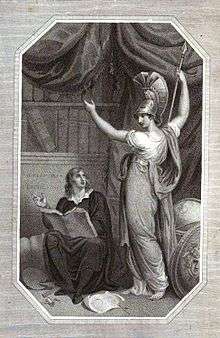Encyclopædia Perthensis
The Encyclopædia Perthensis was a publishing project around the Morison Press in Perth, Scotland undertaken in the 1790s, with the involvement of James Morison.[1] Morison went into partnership with Colin Mitchel and Co.[2]

Editions
The Encyclopædia was issued in weekly instalments from 1796 to 1806, then republished in a 23 volume set in 1806. The first edition had the subtitle "Universal dictionary of knowledge, collected from every source and intended to supersede the use of all other English books of reference." [3]
Like the first edition, the second was originally issued in weekly instalments. These were issued from 1807 to 1816. In the last year the encyclopedia was issued as a 24 volume set, with the last volume being a supplement to the original text. The subtitle was changed to "Universal dictionary of the arts, sciences, literature, &c. intended to supersede the use of other books of reference."[4]
Content
Most of the text was taken verbatim from the third edition of Encyclopædia Britannica. The first edition includes a rare early plan of Washington D.C. It had twenty-three 8vo volumes with plates and maps. The main contributor and editor was Alexander Aitchison, member of the Royal Physical Society of Edinburgh.[5][6]
The majority of the 370 plates and maps claimed by the second edition, where credited, are signed T Clerk Sculpt. Edinr. Two other artists, J Stewart and J Frasier, have signed plates. Though 370 plates and maps are claimed on the title pages, there are only directions for the placement of 348 plates, of which only one could be described as a map, a plan of Washington, D.C. in 1800 by Andrew Ellicott.
Notes
- Carnie, Robert Hay. "Morison, Robert". Oxford Dictionary of National Biography (online ed.). Oxford University Press. doi:10.1093/ref:odnb/65126. (Subscription or UK public library membership required.)
- John Craigie; John Shaw Stewart; Thomas S. Paton (1856). Reports of Cases Decided in the House of Lords: Upon Appeal from Scotland, from 1726 to [1822] ... T. & T. Clark. pp. 265–.
- Robert Collison Encyclopedias: their history throughout the ages 2nd ed. New York and London; Haffner Publishing Company 1966 pp.178
- Robert Collison Encyclopedias: their history throughout the ages 2nd ed. New York and London; Haffner Publishing Company 1966 pp.178
- Encyclopaedia Perthensis (1807). The new encyclopædia; or, Universal dictionary of arts and sciences. p. 12.
- Joseph W. Dauben; Christoph J. Scriba (23 September 2002). Writing the History of Mathematics - Its Historical Development. Springer. p. 165. ISBN 978-3-7643-6167-9.
External links
- Encyclopaedia Perthensis; or Universal dictionary of the arts, sciences, literature, &c. intended to supersede the use of other books of reference. second edition, 23 volumes; Edinburgh: Printed by J. Brown, 1816